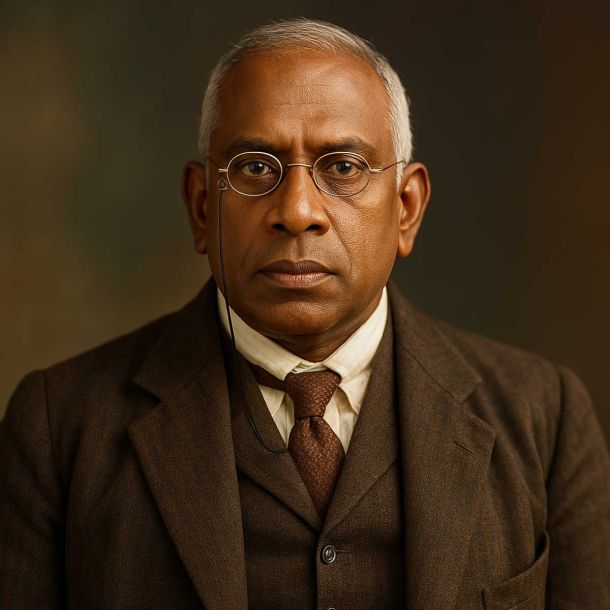MORE COVERAGE
“Instead of causing chaos and rocking someone else’s boat, you need to row your own”: Prof Berry, a strong advocate of racial preferences in employment & education, said “Civil Rights laws were not passed to give civil rights protection to all Americans”

When The Professors was first published in February 2006, it was greeted by cries of outrage from the academic Left. The author was denounced as a reincarnation of Joseph McCarthy and his book as a “blacklist,” although no evidence existed to support either claim and both were the opposite of the truth.
Far from being a “blacklist,” the text explicitly—and in so many words—defended the right of professors to teach views that were unpopular without fear of political reprisal. The author also publicly defended the First Amendment rights of Ward Churchill, the most notable case of a professor under attack for his political views.
This book is not intended as a text about left-wing bias in the university and does not propose that this bias is necessarily a problem. Every individual, whether conservative or liberal, has a perspective and therefore a bias. Professors have every right to interpret the subjects they teach according to their individual points of view. This is the essence of academic freedom.
But they also have professional obligations as teachers, whose purpose is the instruction and education of students, not to impose their biases on students as though they were scientific facts. The professorial task is to teach students how to think, not to tell them what to think. In short, it is the responsibility of professors to be professional—and therefore “academic”—in their classrooms, and therefore not to require students to agree with them on matters which are controversial.
|
Professor Mary Frances Berry, University of Pennsylvania
— Geraldine R. Segal professor of American social thought and professor of history, University of Pennsylvania
— Chairman, Civil Rights Commission 1993-2004
— “Civil Rights laws were not passed to give civil rights protection to all Americans.”
Born in 1938 in Nashville, Tennessee, Mary Frances Berry has been the Geraldine R. Segal professor of American social thought and professor of history at the University of Pennsylvania since 1987. In 1990–91, she was president of the Organization of American Historians, one of the two principal professional associations of American historians, both of which have been dominated by the Left for nearly two decades. She has also held administrative posts at the University of Maryland and served as the Chancellor of the University of Colorado at Boulder.
Professor Berry is the holder of an endowed chair at an Ivy League university, one of the most prized positions in American higher education. Yet she has almost no traditional academic credentials for holding such a position. According to her official bibliography, in the course of her university career, Professor Berry has authored no scholarly books (merely a series of texts whose titles reveal their ideological agendas) and only two peer-reviewed academic articles.
|
The first article was published in 1991 in the Journal of American History. The second is a five-page article “Vindicating Martin Luther King, Jr.,” which appeared in the Journal of Negro History in 1996. A third article appeared in a student-edited law school journal and is not even sourced. Professor Berry’s Journal of American History article, “Judging Morality: Sexual Behavior and Legal Consequences in the 19th Century South,” begins in the following fashion:
“The legal system supports our capitalist economic system. Because capitalism requires inequality, the only real question is who will be the repositories of the inequality. To date, black people have disproportionately been those repositories.” This is a representative sample of her work.
As a member of a Department of History—and despite her lack of actual peer-reviewed scholarship—Professor Berry votes on all the hires and promotions of scholars in the department. As a full professor, her vote carries special weight. Thus Professor Berry will be shaping historical studies at the University of Pennsylvania for a long time to come.
Apart from her academic career, Professor Berry has had a long career in government, which she began as an Assistant Secretary of Education in the former Cabinet Department of Health, Education, and Welfare under then-president Jimmy Carter.
After Dr. Berry returned from a trip to China and stated that Americans had no right to criticize Communist China’s education system for requiring students to “develop what they call socialist consciousness and culture,” Carter transferred her to the U.S. Civil Rights Commission.
As Berry critic and head of the Center for Equal Opportunity, Linda Chavez points out, “China’s higher education system was still reeling from the devastating effects of Mao’s bloody Cultural Revolution, which forced millions of intellectuals, ordinary teachers and students into forced labor on collective farms, or sent them to re-education camps where they faced torture and death.
Berry, then the government’s top-ranking official in higher education, nonetheless praised China’s education system as a model for the United States and publicly criticized the press for printing ‘false’ reports about the Chinese system.” Practicing what she preached, Professor Berry was accustomed to carrying Mao Zedong’s Little Red Book of Communist dicta in her purse.
|
Denouncing America’s systemic flaws, while comparing it unfavorably to Communist states, has been a longstanding practice for Professor Berry. She complained, for instance, that the U.S. media’s “massive barrage of propaganda” had made black Americans blind to the Soviet Union’s virtues, including its “safeguards for minorities,” “equality of opportunity,” and “equal provision of social services to its citizens.” With perfect consistency, Professor Berry characterized the 1960s as an era when blacks in America lived under a “threat of genocide”’ that was “roughly comparable” to what Jews faced in Hitler’s Germany.
This absurdity is belied by the national support Martin Luther King’s crusade for civil rights in the South received, while the Civil Rights Acts themselves passed by 85% and 90% majorities in Congress. In an interview on National Public Radio in April 2005, Professor Berry dismissed United States complaints of human rights violations in Cuba as examples of “the pot calling the kettle black.” In other words, Professor Berry—a person with a six-figure salary, holder of a prestigious post at a famous American university, and being interviewed respectfully on the national government-funded radio network—believes she is oppressed and living in a dictatorship.
Professor Berry served on the Civil Rights Commission from 1980 until 2004. Ronald Reagan, early in his presidency, attempted to fire Professor Berry from the Commission, arguing that as a political appointment she served at the pleasure of the president. But Professor Berry sued and eventually won in federal district court the right to keep her post. She said, “I decided to sue him [Reagan] because he shouldn’t be allowed to fire a commissioner just because he doesn’t like the commission reports. Then you could only do reports that people liked, and why have a civil rights commission at all?”
President Clinton made her the chair of the Civil Rights Commission in 1993, a position she held until President George W. Bush eventually dismissed her in 2004 despite her determination to stay on past her constitutional term.
In Professor Berry’s radical perspective, white racism is an intractable and pervasive crisis in America fifty years after the civil rights revolution.
“The primary explanation for racially motivated violence against blacks,” according to the professor, “has been the need of a segment of the white population to preserve [its] belief in the inferiority of blacks, and to maintain the social and political subordination of a historically outcast group by any means, including violence.”
Professor Berry is a strong advocate of racial preferences in employment and education. In his book The End of Racism, scholar Dinesh D’Souza quotes Berry’s response to the idea that racial preferences are inconsistent with the mandates of civil rights laws: “Civil rights laws were not passed to give civil rights protection to all Americans,” she said. Professor Berry opposes the concept of race neutrality in hiring and college admissions because she believes white America has an ongoing desire to relegate blacks to subservient roles. She does not explain why white Americans support affirmative action policies for black Americans if their desire is to keep blacks subservient.
|
Professor Berry condemned President Reagan and his administration as people who “never met a civil rights law they liked.” The laws to which she was referring were all laws encompassing race-based preferences, precisely what Martin Luther King’s civil rights movement had been created to oppose.
In Professor Berry’s opinion, Republican appointments of African Americans such as Clarence Thomas, Condoleezza Rice, and Colin Powell to the highest positions of authority and power in government were anti-black in intention. Their purpose was to fool African Americans into thinking that they lived in a nation where they could in fact succeed on merit, where whites were not plotting collectively to keep them in their place.
This delusion causes blacks to accept complacently a status quo that is far more oppressive and discriminatory than they realize. Says Professor Berry: “The reason there is no agitation among blacks—I don’t see any—is because the symbolism is such that you could tell yourself—until something happens to you—that nothing is wrong. You could say, ‘Look at Colin Powell. Blacks are everywhere. We can just do anything.’ Our people don’t draw a distinction between what people are doing.” In other words, blacks who do not carry around Mao’s Little Red Book like Professor Berry are too dumb to understand the difference between appearance and reality.
Research: John Perazzo
References:
The Professors: The 101 Most Dangerous Academics in America - David Horowitz
 Support Us
Support Us
Satyagraha was born from the heart of our land, with an undying aim to unveil the true essence of Bharat. It seeks to illuminate the hidden tales of our valiant freedom fighters and the rich chronicles that haven't yet sung their complete melody in the mainstream.
While platforms like NDTV and 'The Wire' effortlessly garner funds under the banner of safeguarding democracy, we at Satyagraha walk a different path. Our strength and resonance come from you. In this journey to weave a stronger Bharat, every little contribution amplifies our voice. Let's come together, contribute as you can, and champion the true spirit of our nation.
 |  |  |
| ICICI Bank of Satyaagrah | Razorpay Bank of Satyaagrah | PayPal Bank of Satyaagrah - For International Payments |
If all above doesn't work, then try the LINK below:
Please share the article on other platforms
DISCLAIMER: The author is solely responsible for the views expressed in this article. The author carries the responsibility for citing and/or licensing of images utilized within the text. The website also frequently uses non-commercial images for representational purposes only in line with the article. We are not responsible for the authenticity of such images. If some images have a copyright issue, we request the person/entity to contact us at satyaagrahindia@gmail.com and we will take the necessary actions to resolve the issue.
Related Articles
- "Hindu school of History needed": A call for a new narrative amidst Diverse Historical Interpretations, contrasting views of Communist Historians and Aligarh Apologists, to provide a comprehensive understanding of medieval India's intricate past
- Professor M. Shahid Alam, Northeastern University: The 101 Most Dangerous Academics in America
- Purification - Understanding Islam through Hadis - Religious Faith or Fanaticism
- "To win this war, we need a commander in chief, not a professor of law standing at the lectern": Prof. Barash is not a trained historian, economist, or sociologist but a psychologist, while his co-author Professor Webel is a philosopher, let's teach Hate
- "Purpose of creation of man, according to Islam, is that he should worship Allah": As there is one Allah, one Guide, one Book, there is also one Prayer, caught and fixed in a single formula, Islam has all ideological ingredients of imperialism in any age
- “Abuses of the University”: Professor Berube described University as “the final resting place of the New Left,” said those who failed to regard “feminist or queer theory as a legitimate area of scholarship”—were only perpetuating “ignorance and injustice
- Professor Hamid Algar, University of California, Berkeley: The 101 Most Dangerous Academics in America
- "Fighting for Islam, that is not suicide. They kill themselves for Islam": Ihsan Bagby, Prof. of Islamic studies at Kentucky University declared that Muslims can never be full citizens of the US as they can never commit to its institutions & ideologies
- “There is no greater agony than bearing an untold story inside you”: Premchand, a celebrated Hindi-Urdu writer was often claimed by leftists as representing their ideology, however, his story 'Jihad' suggests that he was, in fact, a true nationalist
- "In public realm, secularism should not concede a single inch to religious intrusions": India never knew a theocratic state till Islam entered Bharat, Hindu Dharma always was a pluralistic religion till genesis of Nehruvian Secularism for mystic reasons
- "Crumbling Chronicles, their stories yearn to be retold": Each intricately carved stone horse in the Pir Panjals carries a profound secret. Once symbols of Bharat's grandeur, now overshadowed by indifference, and their plea for acknowledgment grows louder
- Asst. Professor of Comparative Literature at Columbia University, Gil Anidjar is an Anti-Israel activist, apologist for Islamic radicalism and identifies “good teaching” with pro-Palestinian activism: The 101 Most Dangerous Academics in America
- Professor of Political Science at Columbia University, Professor Lisa Anderson regards America’s wars of liberation in Afghanistan and Iraq as “an assault on the entire region”: The 101 Most Dangerous Academics in America
- Hindu seers and sages could tap sources of universal spirituality because they did not start with an a priori assumption of an Almighty God whom man had to fear and obey in awe and objection - Defence of Hindu Society
- Historian with Communist glasses: When Pandit Nehru rose to unrivalled power and position in India his book 'Glimpses of World History' was recommended as a reliable reference work for advanced students of history in Indian universities
Related Articles
Twitter Coverage
Satyaagrah
Written on
Satyaagrah
Written on
Satyaagrah
Written on
Satyaagrah
Written on
Satyaagrah
Written on




















